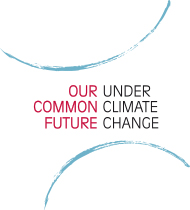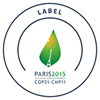Our Common Future Under Climate Change
International Scientific Conference 7-10 JULY 2015 Paris, France
- Home
- Side Events
- 167 Climate Observing Systems
CLIMATE OBSERVING SYSTEMS
Overview
Title: Climate observing systems
Overview: This side event will host the overflow of papers submitted to the CFCC parallel session �Assessing climate observations (1105a)� on July 7.
Organizers: J.-L. Fellous (COSPAR)
Date: 8-9 July 2015, 16:30-18:00
Location: Salle de l�Espace, CNES, 2 place Maurice-Quentin, 75001 Paris
Expected number of participants: 50-100
Nature of participants: Scientists, decision-makers, program managers
Keywords: climate observation
Keynote speakers: None
Summary
Papers will address various observing systems, both space-based and ground-based, which aim at providing climate-relevant observations. The following papers and authors have confirmed attendance:
July 8, 16:30-18:00 (20� per paper, 10� general discussion at the end) � Moderator: P. Lecomte (ESA)
- The BIOMASS satellite mission: quantifying global biomass, an essential variable of the climate system, by T. Le Toan (1), P. Ciais (2), S. Quegan (3) and K. Scipal (4). (1) CESBIO, Toulouse, France; (2) IPSL, Lsce, Gif sur Yvette, France; (3) University of Sheffield, Sheffield, United Kingdom; (4) ESA , Estec, Noordwijk, Netherlands
- Satellite-derived aerosol climate data records in the ESA Aerosol_cci project, by G. De Leeuw (1), T. Holzer-Popp (2), S. Pinnock (3) and the Aerosol_cci Team (4). (1) FMI & UHEL, Climate Research / Physics, Helsinki, Finland; (2) DLR German Remote Sensing Data Center (DFD), Oberpfaffenhofen, Germany; (3) European Space Agency (ECSAT), ESA climate office, Harwell, Oxfordshire, United Kingdom; (4) FMI, Climate research, Helsinki, Finland
- The Pacific Islands Global Climate Observing System (PI GCOS): Where to Next? By PF. Lefale (1) and HJ. Diamond, (2). (1) Bodeker Scientific, Wellington, New Zealand; (2) Victoria University of Wellington, Geography department, Wellington, New Zealand
- Expanding the Network of Precise Seawater Temperature Measurements for Fijian Coral Reefs, by A. De Ramon N'yeurt (1) and C. Whippy-Morris (2) (1) The University of the South Pacific, Pacific Center for Environment and Sustainable Development, Suva, Fiji; (2) The University of the South Pacific, Institute of marine studies, Suva, Fiji
July 9, 16:30-18:00 (20� per paper, 30� general discussion at the end) � Moderator: Pascale Ultr�-Gu�rard (CNES)
- Monitoring the Climate of the Upper Troposphere and Lower Stratosphere with Radio Occultation Data, by U. Foelsche (1), B. Scherllin-Pirscher (2), J. Danzer (2), F. Ladst�dter (2), AK. Steiner (2) and G. Kirchengast (2). (1) University of Graz, Institute for Geophysics, Astrophysics, and Meteorology, Graz, Austria; (2) University of Graz, Wegener Center for Climate and Global Change, Graz, Austria
- Observing Climate Variability and Change with GPS Radio Occultation, by AK. Steiner (1), B. Scherllin-Pirscher (1), F. Ladst�dter (1), L. Brunner (1), M. Schw�rz (1), R. Biondi (1), J. Fritzer (1), J. Schwarz (1), U. Foelsche (2) and G. Kirchengast (1). (1) Wegener Center for Climate and Global Change, University of Graz, Graz, Austria; (2) Institute for Geophysics, Astrophysics, and Meteorology/Institute of Physics, University of Graz, Graz, Austria
- The role of the GCOS Reference Upper-Air Network (GRUAN) in climate research, by G. Bodeker (1), M. Sommer (2), R. Dirksen (2) and P. Thorne (3). (1) Bodeker Scientific, Alexandra, New Zealand; (2) Deutscher Wetterdienst, Lindenberg, Germany; (3) Maynooth University, Department of geography, Maynooth, Ireland
More information
In view of security regulations, it is necessary to register in advance to attend this side event. Send your name, surname, affiliation and country of citizenship to the following email address:
[email protected]
Also make sure to hold a valid ID card with you to enter the CNES building.



